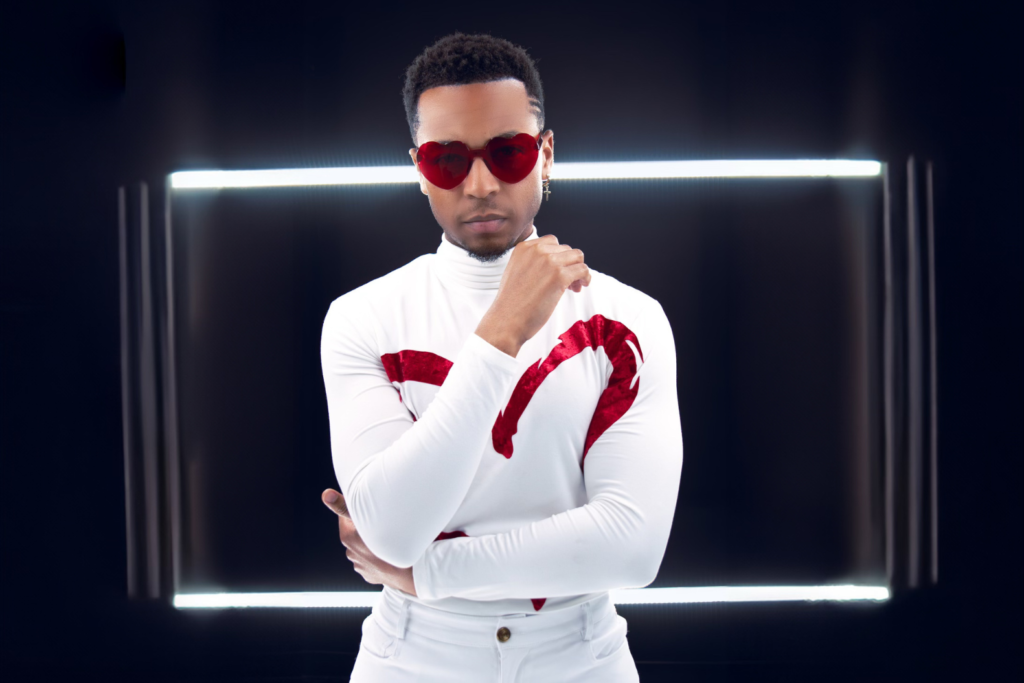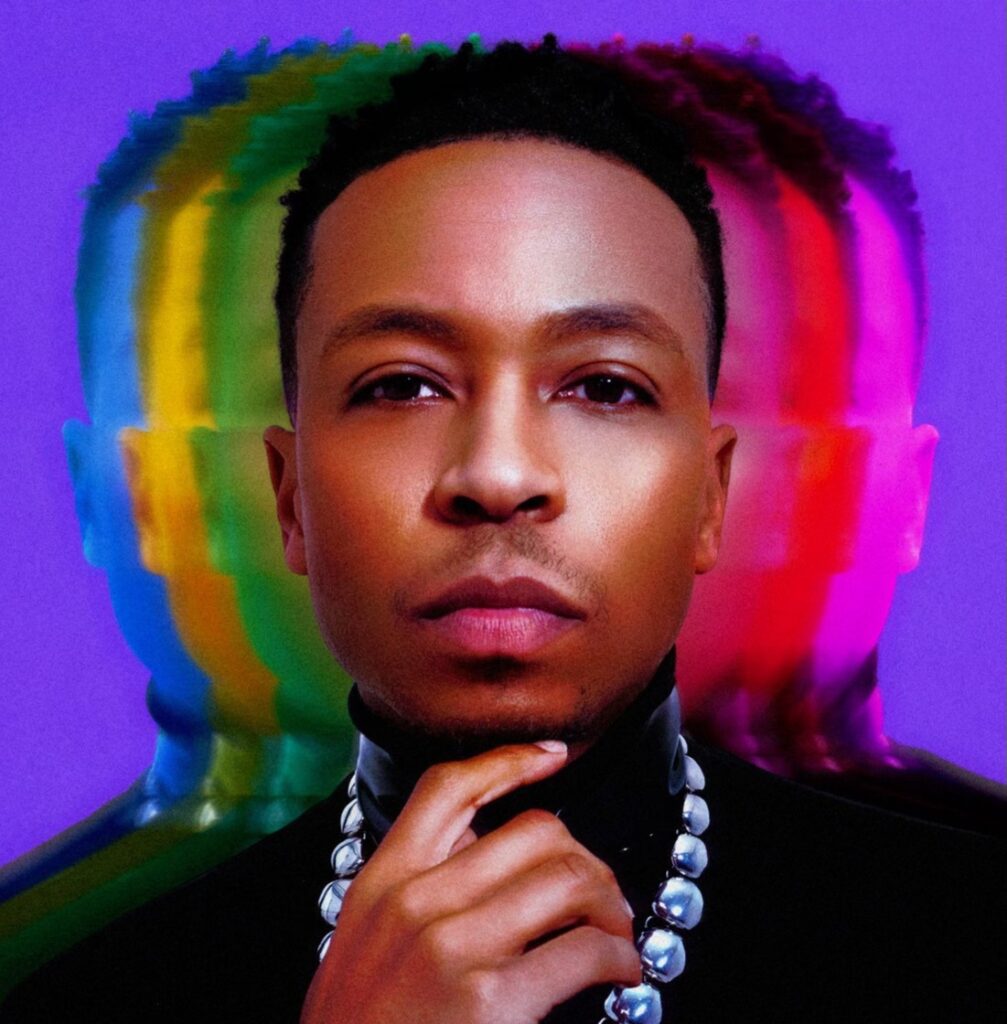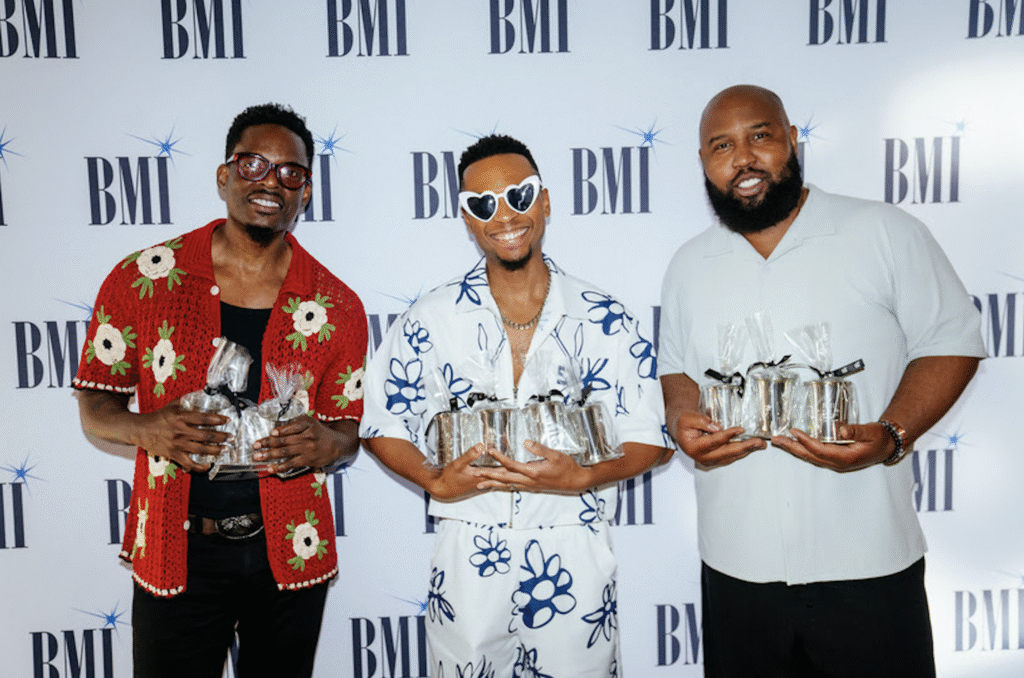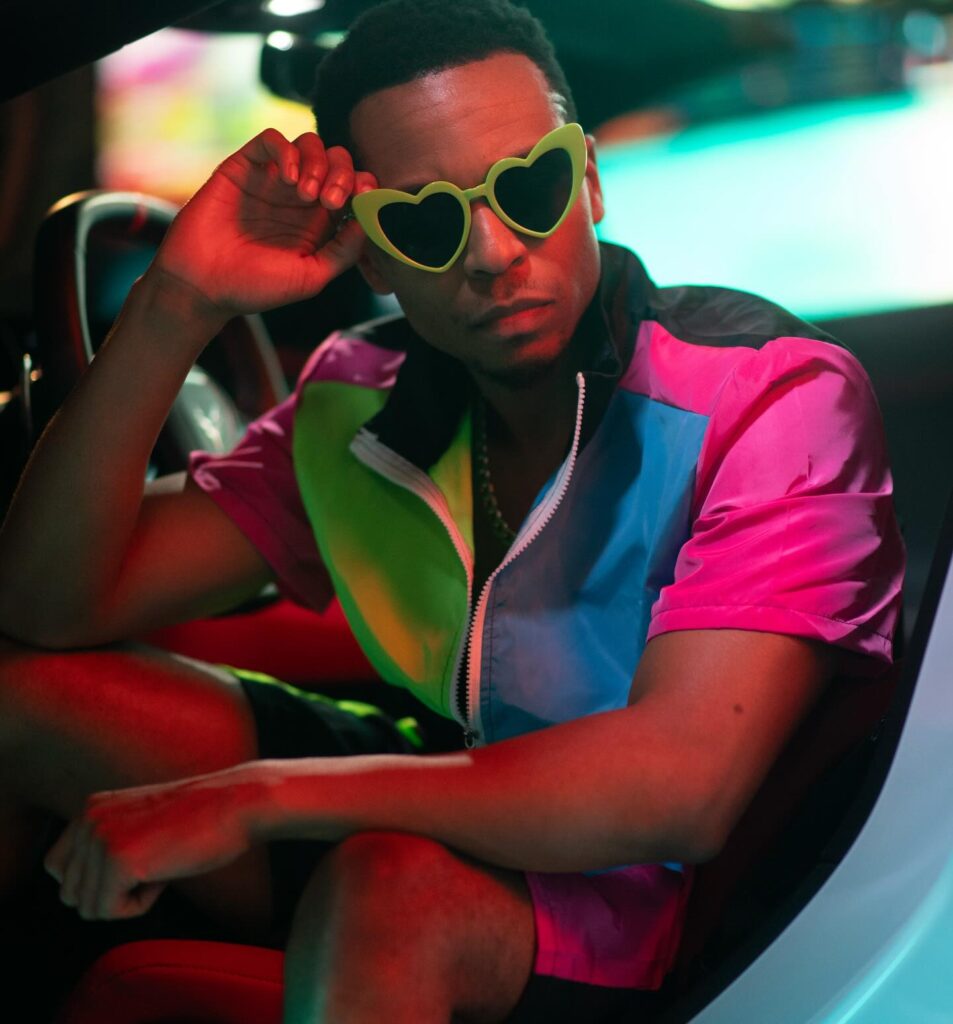Kevin Ross is on a mission.
“My job is not to show you how well I can sing, write, or produce a song. My job is to show you how indie R&B is supposed to be done, what matters and what doesn’t,” the singer-songwriter and producer tells Rated R&B over a video call.
It’s early afternoon in late August, and Ross is at his parents’ home in Washington, D.C., chomping on a bowl of blueberries and blackberries. “I got some stuff to do today, so I’ve got to reenergize,” he shares before tossing another blackberry in his mouth.
He just returned from a quick trip to Nashville to celebrate the success of his No. 1 hit “Love in the Middle,” which topped Billboard’s Adult R&B Airplay chart for four weeks. BMI, a performing rights organization, hosted a party for Ross and his collaborators, Claude Kelly and Chuck Harmony, who co-wrote and produced the feel-good track.
“Love in the Middle” is lifted from Ross’ new album, Love Uptempo: Max, released Aug. 28 via his label Art Society Music Group and EMPIRE. It marked his first chart-topper as an independent artist and his second overall, following 2016’s “Long Song Away,” released under Motown Records.
For Ross, it wasn’t just a personal win but a victory for the indie R&B community. This year alone has seen several independent R&B artists reach milestones on R&B radio, including trio Psiryn, who became the first girl group in 23 years to top the Adult R&B Airplay chart with “Sober.” Meanwhile, R&B veterans Eric Benét and Chanté Moore’s duet “So Distracted” went No. 1, while rising acts such as Jack Freeman and Jane Handcock respectively achieved their first Billboard-charting singles.
“I think for indie artists, we spend so much time feeling like we’re just being tolerated. To be celebrated for our contribution to the ecosystem means so much,” Ross adds about the BMI-hosted celebration for his No. 1. “My whole project has been based on the fact that for the future of R&B to thrive, it starts with the independence of it.”

Ross’ independent journey began in 2019, when he announced his departure from Motown Records. “Ownership means a lot more to me at this stage in my life. I’m grateful for the experience, but it was time to move on,” he said in a January 2019 press statement. In the summer of the same year, he announced his partnership with independent distribution company EMPIRE.
“Going indie at the time I went was truly a blessing,” Ross reflects to Rated R&B. “It was months before COVID. It was like, ‘OK, I released my first record and we’re off to the races.’ Then COVID came, and it’s like, ‘Sit down.’ I was able to watch the whole industry figure it out. I wasn’t the only one scraping and scrambling; everybody was, and it leveled the playing field.”
Ross has undoubtedly been on a consistent run this decade. In 2020, he released his first indie project, Audacity, Vol. 1, which was followed up with Audacity Vol. 2 and Audacity Complete.
Keeping the momentum going, in 2021, he dropped Drive 2, the sequel to his 2017 EP, then returned in 2023 with Midnight Microdose, Vol. 1 and Midnight Microdose, Vol. 2. The former included “Look My Way,” a top 10 hit on Billboard’s Adult R&B Airplay chart.

Ross’ latest offering, Love Uptempo: Max, expands on Love Uptempo, Vol. 1, released in April. Sonically, Love Uptempo: Max merges R&B, afrobeats, amapiano, U.K. garage, and a dash of Jersey club into an insistent dance groove where romance and joy deepen the euphoric escape. The lovestruck “Back 4 More” adds a funky sheen to its nu-disco feel.
Tracks like “Afrolude” and “Spin,” including the Matt B-assisted version, dabble in afrobeats, while “Luxury Lust” breezes over an amapiano backdrop. No matter the tempo, Ross’ honey-coated voice never falters, as evidenced by the live rendition of “Love in the Middle.”
Love Uptempo: Max is smooth to its core. Even with fusing genres from different parts of the world, it flows like a meticulously crafted playlist of serotonin-boosting jams. The album was calibrated to provoke movement.
Below, Kevin Ross reflects on his success as an independent R&B artist, shares his vision for setting a blueprint for future acts, explains why he releases projects in installments, and discusses the creative intent behind Love Uptempo: Max.
“Love In The Middle” became your second song to reach No. 1 on Billboard’s Adult R&B Airplay chart. What did it mean for you to achieve this as an indie artist?
The success of it has been very humbling, especially because it’s under my own imprint, Art Society Music Group. To go No. 1 and be No. 1 for four weeks says a lot. It is a battle getting it to No. 1. Once you get to that place, it is up to the conglomerate, the [program directors], and the audience to decide whether or not it stays there. Also, people wanted a good two-stepping song for the summertime, and me, Claude [Kelly] and Chuck [Harmony] delivered.
You celebrated your No. 1 hit at a BMI event in Nashville. How did that moment feel for you?
It felt good to fly to Nashville, to be celebrated [and] to see so many people in the audience. I think for indie artists, we spend so much time feeling like we’re just being tolerated. To actually be celebrated for our contribution to the ecosystem means so much. My whole project has been based on the fact that in order for the future of R&B to thrive, it starts with the independence of it. We need more independent blueprints as R&B artists in order for not only the industry, but for the world to see.

You tend to release projects in parts. What’s your intention with this method?
It is my reflection of the coaching. If I see that you can barely look at a minute’s worth of a video, why would I expect you to listen to 12 songs if you’ve never heard of me? I would rather give people small doses. It feels less intimidating to get through five songs. Now, if you’re a fan of somebody and you’re willing to go on that journey, then fine, but for most people, they’re literally going on [streaming services] and being like, “OK, cool. I’ve heard this name. Let me check it out. It’s five songs. I can get through that.” You’ve got to meet people where they are.
What inspired the sonics we hear on your album Love Uptempo: Max?
I wanted something high vibrational, so I started with that. I’m a fan of music first [and] I’m a student of it. Every Friday, I’m tuning into whatever people are listening to. I’m listening to all of the obscure playlists [and] taking in this information because I want to be a fan of something. Because this is my livelihood, I still want to be able to enjoy it, and luckily, I still do.
In listening to certain things and being a fan of it, it’s certain artists I look to and say, “OK, they’re going to deliver this,” and then they don’t. Then I’m like, “Ah, void, OK.” I collect these voids, and this becomes my inspiration. I work better in voids because where things are missing, I can then thrive. So if I say, “There’s not enough mid to uptempo, let me fill this void,” then I can craft it to say, “OK, how would I sonically put my imprint in this void?” It’s not to fill in the whole thing, but to put up a beacon of light to say, “There’s a void here.”
What void did you want to fill for “Luxury Lust”?
I’m a fan of Afrobeats and amapiano. If people have listened to my catalog, whether that is “Spin” from Love Uptempo: Vol. 1, “Cocoa” off Midnight Microdose, “WaveRunner” from Drive 2, I’ve been putting together a demo, I would say, for me to get to the continent of Africa by music through music — a demo for all the amapiano artists and producers. Sonically, “Luxury Lust” felt good to me. It’s something I felt was a good palate cleanser for [Love Uptempo: Max], so for the people who haven’t heard the project at all, it’ll be a pleasant surprise wherever they’ve picked up from or if what is “Love in the Middle,” and then you hear “Luxury Lust,” these are two opposing things can still coexist.
What inspired “Check In”?
Craig David’s first album [Born to Do It] inspired that absolutely. There’s no way to dance around that. Heavily inspired by the early 2000s U.K. type of feel and tracks. I didn’t want Craig’s approach to it, but I did want the sonic bed for me to put my DNA inside of it. Shout out to Romeo Taylor for producing it and co-writer Niguel Spruill. That was a fun one for sure.
How about “They Don’t Know About Us”?
It’s a Jersey Club type of feel. I wanted to do something halfway toxic [and] halfway emotional, but still gave tempo. Shout out to Justin Love, who produced it. He’s from Jersey himself. I was like, “I’m not going to think too heavy on this. This feels good. This is a very interesting take on Jersey Club and R&B. Let’s do it.”
Love Uptempo: Max has qualities of a traditional R&B album, such as an intro, interlude, etc. How do you balance conventional aspects while staying current?
It’s about being a bridge. I don’t think a lot of artists have the responsibility of paying homage to their predecessors while living in the present and building a way for the future. There’s a short list of artists who have the potential or who are actually walking that line. I happen to be one of those people walking that line in a sense to say, “I love what I grew up on — the traditional sense of it. However, I want to acknowledge the present by saying my songs can’t be as long as they once could have been.” It’s like, “All right, cool. At least let me get intros and interludes from the past. Let me crunch down this time for the present.” But then also building for the future. It’s laying out not just marketing, but a whole business game plan for future R&B artists. That’s the seeds that I’m sowing for the future.

In what way did Love Uptempo: Max move you forward, closer to the vision you have for your artistry?
It pushed me closer to clarity. When I started, I didn’t know what I wanted out of the music business. I wanted to be involved and make it. Then you realize that if you don’t define what “making it” is to you, then you will forever chase after an insatiable beast. I didn’t want to chase anymore. I had to sit down and get clarity to say, “What’s at the end of my rainbow? When I get it, then what?”
Love Uptempo helped make things more clear as far as what’s on the other side of things. Obviously, more music will be coming, but my responsibilities have changed. My job is not to show you how well I can sing, write or produce a song. My job is to show you how indie R&B is supposed to be done, what matters and what doesn’t.
All my heroes are still signed to major labels, and that leaves me with not a lot of people to call on. You’re not working vertically; it’s all horizontal networking. So I get to call Kenyon Dixon and say, “I love this move that you made. How?” Or “Eric [Bellinger], I love this move that you made. How?” We all have different strengths in the business. Kenyon and PJ Morton are becoming Grammy darlings. Eric Bellinger is a streaming darling — he’s going to put them numbers up and put up music at a ferocious rate.
We’re all doing amazing things, respectively. We all have to stay together in how we’re communicating to each other, because it’s not just about us looking at each other in a race, we’re literally building the track field. So as we’re racing and we’re like, “Oh, I fell right there, we might want to patch that up. Oh, there’s something right there.” It’s a cool thing to know I’m not alone in it. But just speaking for myself, it’s like I got to hold myself accountable and represent the way that I know it.
Where do you see yourself within the R&B community, particularly in the indie space?
I’m a trailblazer, for sure. Everybody may not agree with that. I’m definitely a maverick in a sense. I don’t know what the future holds and where everyone else will place me. At this point, because we’re so deep in the trenches, it’s not even my concern. Label me however you want to label me when it’s all said and done. As long as there’s something to talk about in the future, then we did our job. If no one talks about it, then we failed.
Stream Kevin Ross’ new albumLove Uptempo: Maxbelow.